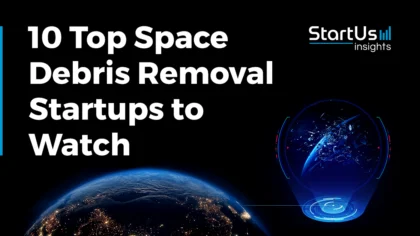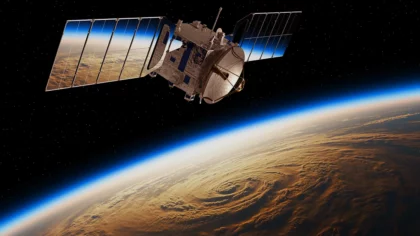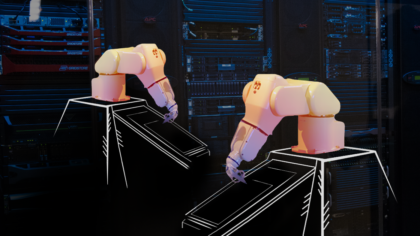Discover 10 companies addressing space debris with advanced technologies. Their solutions enhance orbital sustainability, prevent collisions, and support the safe operation of satellites and spacecraft.
This article highlights innovations like laser-based debris removal, autonomous remediation systems, and controlled de-orbiting technologies.
Learn how these space debris removal companies advance debris tracking, orbital trajectory management, and active debris prevention to ensure the long-term viability of space operations.
Global Startup Heat Map highlights 10 Space Debris Removal Startups to Watch
Through the Big Data & Artificial Intelligence (AI)-powered StartUs Insights Discovery Platform, covering over 5M+ startups, 20K+ technology trends plus 150M+ patents, news articles & market reports, we identified 60+ space debris startups.
The Global Startup Heat Map below highlights the 10 space debris removal startups you should watch in 2025 as well as the geo-distribution of 60+ startups & scaleups we analyzed for this research.
According to our data, we observe high startup activity in Western Europe and the United States, followed by India. The top 5 Startup Hubs for space debris removal are London, New York, Los Angeles, Melbourne, and San Francisco.
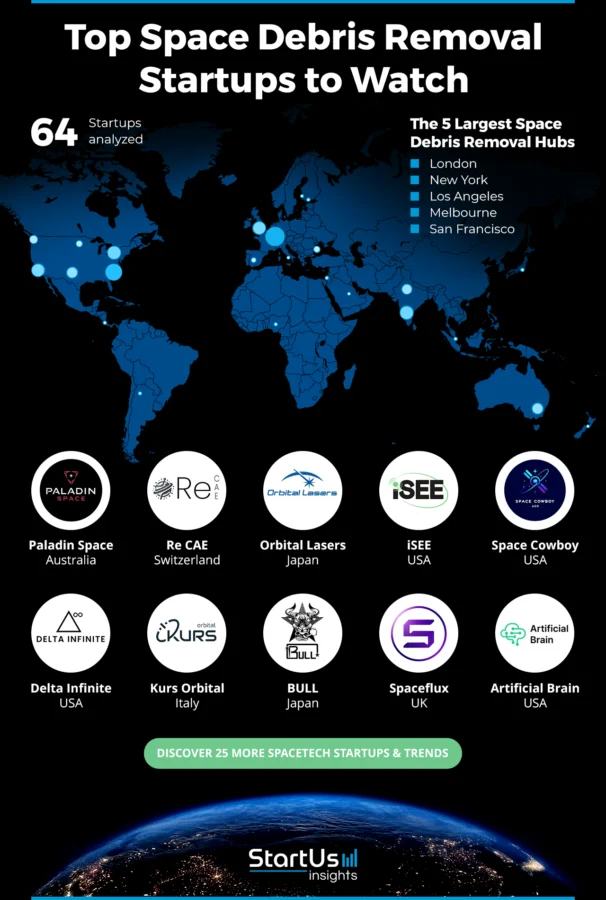
Meet Emerging Space Debris Removal Startups to Watch in 2025
We hand-picked startups to showcase in this report by filtering for their technology, founding year, location, funding, and other metrics.
These space debris cleaning companies work on solutions ranging from controlled de-orbiting and active debris remediation to laser-based removal and orbital trajectory management.
- Paladin Space – Reusable Space Debris Remover
- Re CAE – Controlled De-orbiting of Spacecraft & Satellites
- Orbital Lasers – Laser-based Space Debris Removal
- iSEE – Space Debris Monitoring
- Space Cowboy – Active Debris Remediation
- Delta Infinite – Orbital Debris Management
- Kurs Orbital – Autonomous Space Debris Removal
- BULL – Space Debris Prevention Device
- Spaceflux – Space Debris Tracking
- Artificial Brain – Orbital Trajectory Management
1. Paladin Space
- Founding Year: 2023
- Location: Adelaide, Australia
- Use For: Reusable Space Debris Remover
- Funding: Received USD 100K state government grant in October 2024
Paladin Space manufactures Triton, a reusable satellite payload that removes space debris using autonomous capture and secure containment technology.
Triton collects debris fragments, directs them into Earth’s atmosphere for disintegration, and supports multiple missions through in-orbit refueling and restocking.
Its design enhances operational efficiency by removing multiple debris pieces in one mission while maintaining flexibility for repeated use.
The startup promotes safer and sustainable space operations by reducing collision risks and ensuring debris-free orbital environments.
2. Re CAE
- Founding Year: 2023
- Location: Valais, Switzerland
- Use For: Controlled De-orbiting of Spacecraft & Satellites
Re CAE provides a cloud-based application for controlled de-orbiting of spacecraft and satellites at the end of their lifecycle.
The platform delivers lifecycle assessments, including orbital propagation, collision risk evaluation, and post-mission disposal analysis to ensure responsible end-of-life planning.
It predicts re-entry trajectories and ground impact risks, enabling precise and efficient de-orbiting operations for users.
By covering design to disposal phases, it optimizes mission objectives while reducing the accumulation of orbital debris.
The startup thus ensures safer and more sustainable space activities by enabling responsible satellite disposal practices across the lifecycle.
3. Orbital Lasers
- Founding Year: 2024
- Location: Kawasaki, Japan
- Use For: Laser-based Space Debris Removal
Orbital Lasers develops satellite-based laser technology for removing space debris by altering its trajectory with precise directed energy.
The system vaporizes small debris surfaces to create thrust that safely guides fragments into Earth’s atmosphere for disintegration.
It operates remotely without physical contact, minimizing the risk of additional debris generation during the process.
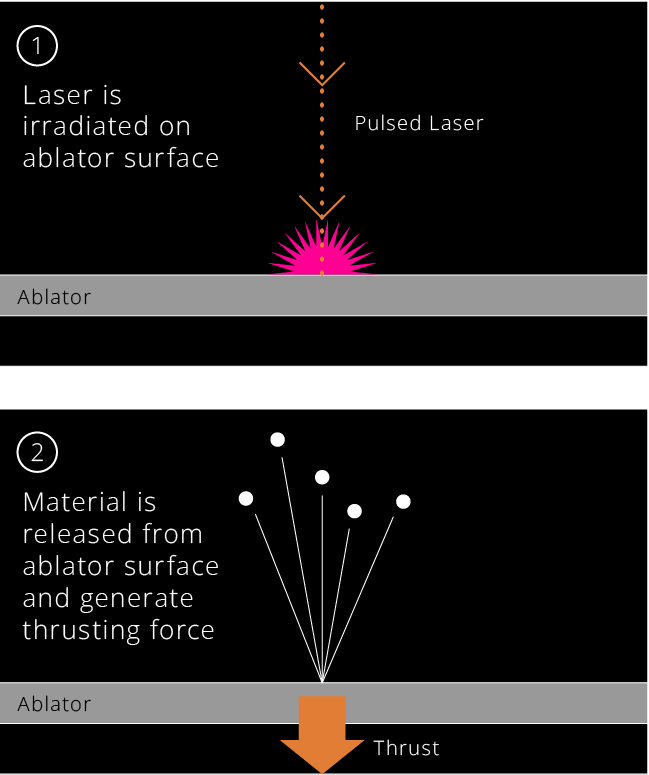
Advanced tracking systems enable the technology to target a wide range of debris sizes and orbital altitudes effectively.
The startup reduces collision risks and clears congested orbits, ensuring safer satellite operations and sustainable orbital environments for future missions.
4. iSEE
- Founding Year: 2023
- Location: Arlington County, Virginia, USA
- Use For: Space Debris Monitoring
iSEE offers an in-orbit radar fence constellation for continuous space debris monitoring across Earth’s orbital environment.
Its system uses radar scanning, impact detection, and AI processing to identify and track objects larger than 2 centimeters.
This technology enables automated decision-making and optimized satellite maneuvers, reducing collision risks and preventing operational asset loss.
By providing 24/7 space domain awareness, it ensures rapid responses to threats and supports collision warnings and space traffic management.
5. Space Cowboy
- Founding Year: 2022
- Location: Austin, Texas, USA
- Use For: Active Debris Remediation
Space Cowboy captures and removes small space debris to reduce operational risks to satellite assets and orbital environments.
Its solution approaches debris, collects data, and collaborates with Space Domain Awareness providers like Privateer Space for improved characterization and tracking.
The startup repurposes captured debris as raw materials for in-space manufacturing, enhancing sustainability in space operations.
Future versions include debris collection and sorting for conversion into wire used in Wire Arc Additive Manufacturing (WAAM) in orbit.
Want to Explore 60+ Space Debris Removal Startups & Scaleups?
6. Delta Infinite
- Founding Year: 2022
- Location: Silicon Valley, California, USA
- Use For: Orbital Debris Management
Delta Infinite develops a proprietary object capture technology for orbital debris remediation. It uses advanced docking mechanisms and precision robotics to securely engage debris of varying sizes, shapes, and spin rates.
By employing material-agnostic tools and adaptive interfaces, the solution ensures the effective handling of diverse debris types, including fragments with unpredictable movement.
The technology integrates real-time data processing and AI-driven decision-making to optimize debris capture and removal efficiency.
By eliminating hazardous objects from orbit, the startup enhances operational safety, reduces collision risks, and fosters long-term sustainability in orbital environments.
7. Kurs Orbital
- Founding Year: 2022
- Location: Turin, Italy
- Use For: Autonomous Space Debris Removal
- Funding: Raised EUR 3.7 million in seed funding
Kurs Orbital offers ARCap Module, an autonomous system for space debris removal and satellite servicing in orbit.
The module uses machine vision, radar, and laser rangefinders to autonomously track, approach, and dock with uncooperative objects of various sizes and spin rates
It features a multi-axis robotic arm equipped with advanced gripping mechanisms to securely capture debris for controlled relocation, de-orbiting, or inspection.
The system integrates real-time data processing and AI algorithms to optimize rendezvous trajectories and docking precision under dynamic orbital conditions.
It supports satellite life extension, docking with space stations, and large-scale debris remediation operations.
8. BULL
- Founding Year: 2022
- Location: Utsunomiya, Japan
- Use For: Space Debris Prevention Device
BULL makes an autonomous device that prevents space debris generation from satellites and spacecraft throughout their operational lifecycle.
The device integrates sensors, AI-driven monitoring, and control systems to detect and address potential debris risks in real-time.
It secures loose components, stabilizes deteriorating hardware, and manages end-of-life deorbiting to prevent collisions or fragmentation.
The system uses propulsion technology to ensure controlled deorbiting of non-operational spacecraft components for safe removal from orbit.
9. Spaceflux
- Founding Year: 2022
- Location: London, UK
- Use For: Space Debris Tracking
Spaceflux provides Space Situational Awareness services using a global network of optical sensors to track and monitor space debris.
Its system combines advanced AI analytics with real-time data to detect and identify debris as small as 10 centimeters.
The platform integrates orbital mechanics modeling and predictive algorithms to calculate debris collision risks and optimize avoidance strategies for satellites.
By delivering detailed insights into debris trajectories and movement patterns, it enhances the accuracy of debris tracking and risk mitigation.
Covering low Earth orbit to cislunar space, the startup ensures safer and more sustainable orbital environments by reducing debris hazards.
10. Artificial Brain
- Founding Year: 2022
- Location: Sheridan, Wyoming, USA
- Use For: Orbital Trajectory Management
- Funding: Secured USD 100K in October 2024
Artificial Brain develops quantum computing software that optimizes orbital trajectory management with a focus on space debris mitigation and avoidance.
Its software leverages advanced quantum algorithms to analyze complex orbital dynamics and predict interactions between satellites and debris in real-time.
By enabling precise trajectory adjustments, it minimizes collision risks, reduces operational disruptions, and ensures the safety of active satellites.
The system also supports long-term debris mitigation strategies by identifying optimal deorbiting paths for inactive objects.
Discover All Emerging SpaceTech Startups
The space debris removal startups showcased in this report are only a small sample of all startups we identified through our data-driven startup scouting approach. Download our free SpaceTech Innovation Report for a broad overview of the industry or get in touch for quick & exhaustive research on the latest technologies & emerging solutions that will impact your company in 2025!

